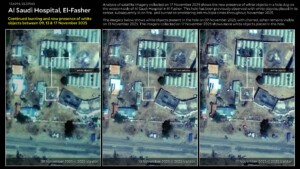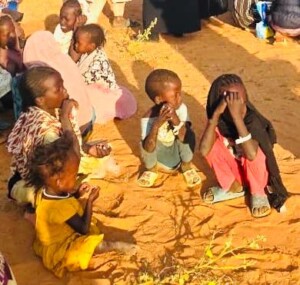Op-ed: The Constitutional Charter and the future of Sudan
The “Constitutional Charter” (CC) signed on August 4 is an inspiring read, if stripped from the grim context in which it has been brought into being—if we forget the many hundreds who have been killed, wounded, raped, and tortured in the course of the uprising that has brought at least the hope of civilian governance into sight. The insistence on human rights, the rule of law, individual liberties, press freedoms, tolerance, and indeed the priority of peace—all of this provides at least the ghostly outline of a what a free and just Sudan—truly at peace with itself—might look like.
 FCC leader Ahmed Rabee and Hemeti with copies of the Constitutional Declaration during the signing ceremony in Khartoum on August 4 (Picture SUNA).
FCC leader Ahmed Rabee and Hemeti with copies of the Constitutional Declaration during the signing ceremony in Khartoum on August 4 (Picture SUNA).
The “Constitutional Charter” (CC) signed on August 4 is an inspiring read, if stripped from the grim context in which it has been brought into being—if we forget the many hundreds who have been killed, wounded, raped, and tortured in the course of the uprising that has brought at least the hope of civilian governance into sight. The insistence on human rights, the rule of law, individual liberties, press freedoms, tolerance, and indeed the priority of peace—all of this provides at least the ghostly outline of a what a free and just Sudan—truly at peace with itself—might look like.
But what has been stipulated in the CC and what seems likely in the near future seem to me two very different things, and I am far from alone in my misgivings. Canvassing Sudanese social media over the past three days—and for months prior to this—I find two major concerns, fundamental issues that many feel have not been addressed by the CC.
The first, and most frequent, is that far too much power has been left in the hands of the military, now a hybrid military, with both the Sudan Armed Forces (SAF) and Rapid Support Forces (RSF) nominally under the command of the “Supreme Commander of the Armed Forces” (CC §34).* Moreover, many have observed that the RSF is left fully intact, a force unto itself, and still effectively under the command of Mohamed Hamdan Dagalo (“Hemeti”). And the further from Khartoum one travels, the more fully the RSF seems a force unto itself—nowhere more so than in Darfur, where since the formation of the RSF under Hemeti’s command in 2013, many hundreds of thousands of people—overwhelmingly from the non-Arab/African tribal groups of the region—have been killed or displaced. And the killing and displacement continue.
In Khartoum itself, all evidence points to a concerted plan by the RSF to undertake what has come to be known as the “June 3 Massacre,” in which more than 150 people were killed (perhaps many more), dozens of women and girls raped, and widespread violence of a sort not seen even during the uprising of September 2013. It is impossible to believe that the orders for the deadly clearance of protesters in front of army headquarters did not come from the Transitional Military Council, and indeed “Lt. General” Hemeti (he has no formal military training, a fact reflected in the lack of discipline throughout the RSF). Unsurprisingly, the RSF was again responsible for the deadly violence in El Obeid on July 29.
The second criticism, voiced in various forms, is that the fundamental economic issues in Sudan—a nation struggling under the burden of an economy that has largely collapsed—are nowhere addressed with any specificity. This is perhaps to be expected of an interim constitutional document, but the greatest hindrance to economic rehabilitation in Sudan has long been the inordinate amount of the national budget devoted to the military and security services. All independent Sudanese economists I’ve encountered estimate that the percentage is between 50% and 70% of all national expenditures.
Will the military men who play such a large role in what was to have been a movement to bring about civilian governance in Sudan willingly give up this previously compulsory largesse, provided by the ordinary people of Sudan? Senior officers have enjoyed what is by Sudanese standards a lavish salary and lifestyle: will they give this up in the interest of the nation?
And what about control of the Jebel Amir gold mining region, about which so much has been made in recent years? Does anyone really think that Hemeti will willingly give up control of a hugely lucrative area he wrested from former janjaweed leader Musa Hilal several years ago?
The point many Sudanese seem to be making is that the greatest obstacle—both to peace in the country and to economic rehabilitation—is the continuing central role of the armed forces in Sudan’s governance over the next 39 months. It may be that the members of the soon-to-be-dissolve Transitional Military Council (TMC) will no longer be able to move with the same ease of executive fiat as was the case during the al-Bashir years. But there are all too many “work-arounds” evident in the constitutional text, as well as the massive inherent power of the “deep state” that so many Sudanese worry about. 30 years of tyranny, corruption, war, and kleptocracy cannot be whisked away with any document, no matter how eloquent or impressively democratic. And Hemeti has proved himself at once hugely ambitious and unreservedly deceitful and expedient.
Here it is important to remember that the al-Bashir regime abided by not one of the agreements it signed during its long tenure: not the terms of the Comprehensive Peace Agreement (annexation of Abyei is only the most egregious violation of the various Protocols of the CPA, signed in January 2005); the Nuba Mountain ceasefire (January, 2002); the Darfur Peace Agreement (Abuja, 2006); the peace agreement with the Eastern Front (October 2006); the Doha Document for Peace in Darfur (July 2011); and the list goes on and on. If history is any guide, the most likely outcome of recent negotiations will be a slow but eventually wholesale reneging on the agreement as soon as international attention turns away from Sudan—and that will not be a long wait.
But such an outcome has one terrible downside for the military, if it indeed seizes national power: the economy will continue its collapse, and we may be sure that protests will resume, with anger even greater, political frustration even more intense. It’s hard to say what the economic consequences of eight months of sustained demonstrations, protests, and strikes has been—but it has been enormous, and the people of Sudan have seen just how powerful they are. Without a massive shift in economic priorities, which will entail cooperation from Sudan’s work force, agriculture will continue to decline; the ability to finance critical imports—including food, medicine, and refined petroleum products—will further diminish; and inflation that has brought so many Sudanese families to the very edge of survival continues to roar ahead, even as the Sudanese Pound continues its precipitous collapse.
More Challenges
Even now, of course, we must note Sudanese concern about what is not in the CC, and that is the July agreement between the Forces for Freedom and Change (FFC) and the Sudan Revolutionary Front (SRF). The armed opposition has universally rejected the CC of August 4, and several political parties in Khartoum have now insisted that any real path forward requires much more participation from those in the armed movements, and especially civil society elements from the regions where the movements have been most active: Darfur, South Kordofan, and Blue Nile. Pessimism is in no short supply.
How will we know if this broadly shared pessimism is warranted? Usefully, the text of the CC provides for some early tests of the military’s willingness to embrace the ideals set forth:
[1] “All people, bodies, and associations, whether official or unofficial, are subject to the rule of law” (§ 5.i). Will we see any change in Darfur, where the rule of law has been only a vague rumour for two decades and more? Where rape, murder, abduction, and pillaging are virtually daily events?
[2] “Upon assuming their positions, members of the Sovereignty Council, Cabinet, governors or ministers of provinces or heads of regions and members of the Transitional Legislative Council submit a financial disclosure including their properties and obligations, including those of their spouses and children, in accordance with the law”(§18.i). Does this apply to RSF commander Hemeti? Will he disclose fully his stake in the large industrial conglomerate Al Junaid Industrial Group, based in the United Arab Emirates? And the role of his brother in the company? And the investments of National Intelligence and Security officials who have been reported as having invested in Al Junaid?
[3] “The General Intelligence Service is a uniformed agency that is competent in national security. Its duties are limited to gathering and analysing information and providing it to the competent bodies. The law defines its obligations and duties, and it is subject to the sovereign and executive authorities by law” (§36). Can we expect to see an end to the arrests and torture for which the “former” National Intelligence and Security Services are notorious? Will all arrests be made only by policemen? These questions are also raised by §45: “Every person has the right to freedom and security. No one shall be subjected to arrest or detention, or deprived of freedom or restricted therefrom except for cause in accordance with procedures defined by law.”
[4] §56 speaks of “the right to access the internet, without prejudice to public order, safety, and morals…” Will we see this? And who decides what is a threat to “to public order, safety, and morals”? Is the conditionality of this language a way to justify future internet shutdowns?
[5] §64 speaks of the State undertaking “to provide primary health care and emergency services free of charge for all citizens, develop public health, and establish, develop and qualify basic treatment and diagnostic institutions.” Does this mean that the ghastly humanitarian embargo imposed by the al-Bashir regime will at long last be lifted from large areas of South Kordofan, after eight years of suffering, hunger, and denial of assistance?
This last test of the intentions of the military could be met tomorrow if a signal were sent to the international community that it should begin to prepare to bring assistance to all parts of South Kordofan and Blue Nile—and that restrictions on aid delivery in Darfur will also be ended.
In short, we could know very soon whether the Transitional Military Council, prior to its dissolution, means to send a signal of good faith. I’m not holding my breath.
* All citations are from a translation of the version of the Constitutional Charter that was signed on 4 August 2019, prepared by International IDEA (www.idea.int).
Disclaimer: The views and opinions expressed in this article are those of the contributing author or media and do not necessarily reflect the position of Radio Dabanga.
 Prof Eric Reeves is a Senior Fellow at Harvard University’s François-Xavier Bagnoud Center for Health and Human Rights. He has spent the past twenty years working virtually full-time as a Sudan researcher and analyst, publishing extensively both in the US and internationally. He has testified several times before the Congress, has lectured widely in academic settings, and has served as a consultant to a number of human rights and humanitarian organisations operating in Sudan. Working independently, he has written on all aspects of Sudan’s recent history. His book about Darfur (A Long Day’s Dying: Critical Moments in the Darfur Genocide) was published in May 2007. He has recently published Compromising with Evil: An archival history of greater Sudan, 2007 — 2012 (available at no cost as an eBook)
Prof Eric Reeves is a Senior Fellow at Harvard University’s François-Xavier Bagnoud Center for Health and Human Rights. He has spent the past twenty years working virtually full-time as a Sudan researcher and analyst, publishing extensively both in the US and internationally. He has testified several times before the Congress, has lectured widely in academic settings, and has served as a consultant to a number of human rights and humanitarian organisations operating in Sudan. Working independently, he has written on all aspects of Sudan’s recent history. His book about Darfur (A Long Day’s Dying: Critical Moments in the Darfur Genocide) was published in May 2007. He has recently published Compromising with Evil: An archival history of greater Sudan, 2007 — 2012 (available at no cost as an eBook)
Radio Dabanga’s editorial independence means that we can continue to provide factual updates about political developments to Sudanese and international actors, educate people about how to avoid outbreaks of infectious diseases, and provide a window to the world for those in all corners of Sudan. Support Radio Dabanga for as little as €2.50, the equivalent of a cup of coffee.












 and then
and then